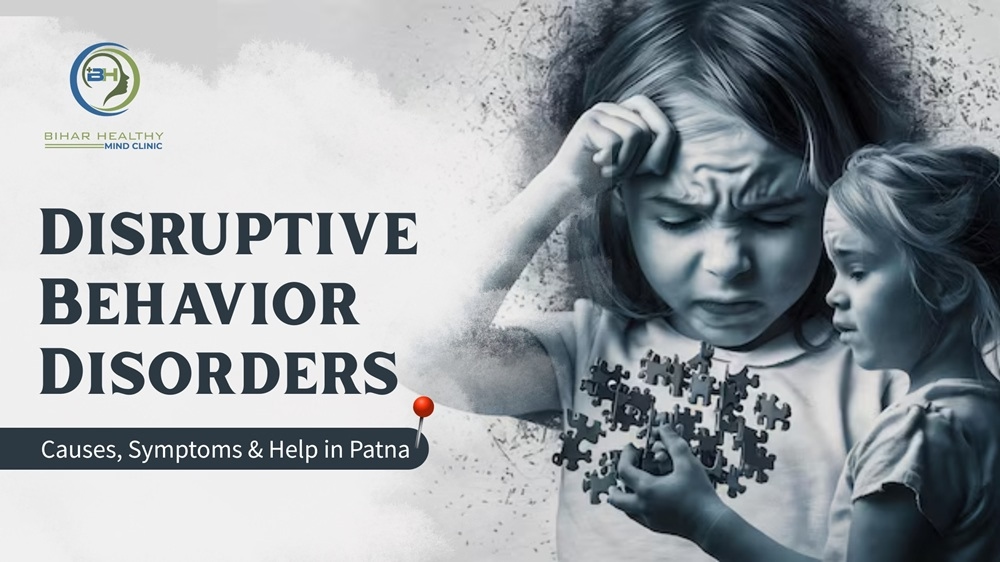
Children often act out, especially when they're tired, hungry, or upset. But when defiant or aggressive behavior becomes persistent, intense, and inappropriate for the child’s developmental stage, it may point toward a disruptive behavior disorder (DBD). At Patna Psychiatry, we understand how difficult and distressing these situations can be for families. Early intervention and professional psychiatric care can help children manage symptoms and lead emotionally balanced lives.
This blog, while written with input from mental health professionals, is intended for informational purposes only and is not a substitute for clinical advice.
What Is Disruptive Behavior?
Disruptive behavior refers to consistent patterns of uncooperative, defiant, hostile, or aggressive actions that interfere with social norms or the rights of others. Children with these behavioral issues often find it hard to follow rules, respect authority, or regulate their emotions.
Disruptive Behavior Meaning
The term “disruptive behavior” encompasses a range of symptoms including aggression, defiance, impulsivity, and rule-breaking. It is more than occasional misbehavior—it’s a persistent pattern that affects relationships, learning, and emotional development.
-
Types of Disruptive Behavior Disorders
Psychiatrists and child psychologists classify disruptive behavior disorders primarily into three types:
-
Oppositional Defiant Disorder (ODD)
Children with ODD frequently:
- Argue with adults
- Refuse to follow rules
- Blame others for their mistakes
- Show anger and resentment
These behaviors typically emerge before the age of 8 and can continue into adolescence if not addressed early.
-
Conduct Disorder (CD)
Conduct Disorder is considered more intense than Oppositional Defiant Disorder and may include:
- Aggression toward people or animals
- Destruction of property
- Stealing or deceitful behavior
- Serious violations of rules
These children often struggle in school and may face legal trouble as teenagers.
-
Intermittent Explosive Disorder (IED)
Characterized by sudden, intense episodes of anger or aggression, IED often appears in older children and adolescents. It is marked by frequent outbursts that exceed what the situation would typically warrant.
-
Causes of Disruptive Behavior Disorders
Multiple underlying factors frequently contribute to the onset of disruptive behavior disorders:
- Genetic predisposition: A family history of mental health issues may increase the risk.
- Neurological factors: Brain structure and neurotransmitter imbalances can contribute.
- Environmental stress: Exposure to violence, neglect, or abuse at home can be a trigger.
- Parenting styles: Overly harsh or inconsistent discipline, or a lack of supervision, may contribute.
- Academic struggles: Learning difficulties can lead to frustration and acting out.
Symptoms to Watch For
-
Parents and caregivers should be alert to signs such as:
- Constant defiance
- Frequent temper tantrums
- Aggressive or bullying behavior
- Lack of empathy or remorse
- Lying or stealing
- Poor peer relationships
If these symptoms last more than six months and significantly disrupt daily functioning, it’s crucial to consult a mental health professional.
Diagnosis & Evaluation
The diagnostic process at Patna Psychiatry starts with a thorough psychiatric assessment. Recognized as the Best Child Psychiatrist in Patna, Dr. Saurabh Kumar conducts detailed assessments using structured interviews, behavior rating scales, and feedback from parents and teachers to reach a precise diagnosis.
-
Evaluation may also involve:
- Developmental history
- School performance reports
- Emotional and cognitive assessments
Treatment Options at Patna Psychiatry
Early and appropriate treatment greatly enhances the long-term prospects for children dealing with DBDs.
-
We offer a multi-modal treatment approach that may include:
-
Behavioral Therapy
- Teaches children how to control anger and develop coping skills
- Reinforces positive behaviors through rewards
- Includes parent training for managing behavior at home
-
Cognitive-Behavioral Therapy (CBT)
CBT helps children:
- Recognize negative thought patterns
- Modify responses to triggering situations
- Build emotional regulation and problem-solving skills
-
Family Counseling
The environment at home and family interactions have a substantial impact on disruptive behavior patterns. Counseling addresses parenting techniques, communication patterns, and emotional support.
-
Medication (If Required)
In some cases, medications such as stimulants, antipsychotics, or mood stabilizers may be recommended alongside therapy to manage severe aggression or attention issues.
-
Support & Education for Parents
Living with a child who has a disruptive behavior disorder can be overwhelming. At Patna Psychiatry, we believe in empowering families through:
- Psychoeducation sessions
- Support groups for parents
- Stress management and relaxation techniques
Why Choose Patna Psychiatry?
Located in the heart of the city, Patna Psychiatry offers a child-friendly, confidential, and compassionate environment for evaluation and treatment. Under the guidance of Dr. Saurabh Kumar, MD (Psychiatry), regarded as the Best Child Psychiatrist in Patna, our clinic delivers evidence-based psychiatric care tailored to each child’s needs.
We work not just with children, but closely with families, schools, and caregivers to ensure holistic recovery.
Final Thoughts
Understanding disruptive behavior disorders is the first step toward early intervention and effective treatment. If your child consistently exhibits signs of aggression, defiance, or emotional dysregulation, don’t hesitate to seek professional help.
Timely psychiatric care can bring positive change, not just for your child, but for the entire family.
Disclaimer: All characters and events depicted in this blog are entirely fictional. Any resemblance to actual persons, living or dead, is purely coincidental. The content is intended for informational purposes only and should not be considered as medical advice. Always consult a qualified healthcare professional for medical concerns.
Visitors: 107





No comments yet.